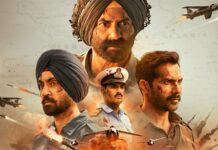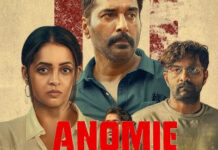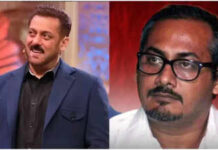Eros International and Bhansali Productions’ Ram-Leela (UA) is a love story set against the backdrop of enmity, hatred, violence and bloodshed. The Sanera and Rajadi clans of Gujarat have been living as sworn enemies for 500 years, killing each other’s members on the slightest pretext. Ram (Ranveer Singh), son of the leader of the Rajadis, is the only Rajadi who does not subscribe to the philosophy of the gun. He wears his heart on his sleeve and romances girls wherever and whenever he can. He falls head over heels in love with Leela (Deepika Padukone) who is the daughter of Dhankor Baa (Supriya Pathak Kapur), the ruthless head of the Sanera clan. Leela also reciprocates Ram’s advances.
Ram and Leela’s love story blossoms even as Dhankor Baa finalises Leela’s marriage to an archeologist. Their love story is on the verge of becoming history one day when Ram’s elder brother, Meghjibhai (Abhimanyu Singh), falls prey to the bullets of the Saneras and, in a fit of rage, Ram kills Leela’s brother, Kanjibhai (Sharad Kelkar). But like Leela overlooks the centuries-old enmity between the two clans, she also overlooks the murder of her own brother at the hands of her lover, and elopes with him. Ram and Leela get married and are hiding in a hotel but even before their marriage can be consummated, Leela is taken away home by her rowdy family members.
Ram is devastated but his family interprets Ram’s separation from Leela as his move to humiliate the Sanera clan and carry forward the enmity. Soon, Ram takes the seat of power from his ageing father. Leela, unable to forget Ram, refuses to marry the boy chosen by her mother.
One day, Ram comes face to face with Leela’s mother who uses the opportunity to cook up a plan to murder Ram on an auspicious day, for which she extends an invitation to him to come to their home. But Dhankor Baa is grievously injured that day and battles for her life in the hospital. Now, Leela replaces her mother in the seat of power.
Soon, Ram and Leela, as the respective heads of their clans, come face to face in a turn of events and decide to end the 500-year-old enmity between the two clans. But it is easier said than done. There are people in Leela’s clan who do not want peace.
Are the two clans able to restore peace? How was Dhankor Baa injured? Do Ram and Leela unite again? Or do they lead their separate lives?
The story is based on Shakespeare’s Romeo And Juliet. It has been brilliantly adapted to Indian conditions. The screenplay, penned by Siddharth-Garima and Sanjay Leela Bhansali, is excellent and painstakingly written. The film has so many twists and turns that it keeps the audience engrossed throughout. The pace is a bit leisurely till the time Ram and Leela elope but after that, the pace picks up and the drama and melodrama increase the intensity of the love story to a very high level. Perhaps, the only aberration in the drama is the fact that there is so much cross-firing in many of the scenes but the bullets seem to hit nobody. There are several scenes where the audience gets what it least or never expects. In the scenes where the drama is predictable, the presentation is so novel and larger than life that the predictability does not matter too much. The intelligence of the screenplay writers manifests itself in scene after scene because of the depth of their writing, the philosophies advocated in the enmity and when the truce is being reached at, and the parallels drawn between the drama of the two clans and in the epic Ramayana. It is these parallels and philosophies which give the film a rare uniqueness and will ensure the film’s successful run at the box-office.
A word here about the characterisations. All the characters have been so intelligently etched out that they would remain in the minds of the viewers for a long time.
In the midst of all these plus points of the script, there is a minus point and that is the lack of heightened emotions. Although the audience feels for the lovers, it does not get an opportunity to shed tears for them. With so many deaths and hurdles in the path of the two love birds, there was ample scope to get the audience teary-eyed but the writers have somehow missed the bus there. Nevertheless, because the audience sympathises with Ram and Leela, the lack of tear-jerking scenes is not sorely felt.
Siddharth-Garima’s dialogues are veritable gems. They have depth and are extremely likeable. The light dialogues bring a smile on the viewers’ lips and the dramatic ones are so weighty that they stay with the audience and greatly add to the impact of the drama. The film’s dialogues will definitely pick up awards!
Ranveer Singh springs a huge surprise by delivering a memorable performance. His dialogue delivery is extraordinary, his body language and facial expressions are praiseworthy and his range as an actor, outstanding. His physique will have guys and girls going ga ga over it. Ranveer’s dances are mind-blowing. Deepika Padukone shines in the role of Leela. She looks fabulously sexy in the traditional Gujarati costumes and is excitingly bubbly in the initial reels. In the more serious and dramatic scenes after her separation from Ram, she is so outstanding that her range as an actress is underlined. If she leaves a lasting impression with her sexy looks, she does the same with her performance. Her dances are to die for. Her costumes and jewellery will become a point of discussion among the female audiences. The chemistry between Ranveer and Deepika is simply electrifying. Supriya Pathak Kapur leaves an incredible impression as Dhankor Baa. Her terrifying persona is matched by her fantastic performance. Richa Chaddha is first-rate as Rasila. Gulshan Devaiah does a truly great job as Bhavani. Abhimanyu Singh is effective as Meghjibhai. Barkha Bisht Sengupta has her moments as Kesar. Utkarsh Naithani, as Karsan, provides entertaining moments. Sharad Kelkar makes his presence felt as Kanjibhai. Sunil Shah, as Nattubhai, and Reshma Merchant, as Damyantiben, lend natural support. Raza Murad, Homi Wadia (as Radhubahi) and Jameel Khan (as Vanka) are good. Tarun Anand (as Ujjwal), Masood Akhtar (as Pujalal), master Md. Faizan (as Goli), Bharat Chawda (as Manga), Anshul Trivedi (as Mandar), Vivek Ghamande (as Pranjeevan), Krishna Singh (as Keshav), Ashrut Jain (as Bater), Kranti Jha (as Veer), Chandrashekhar Dutta (as Velji), Sahedev Girish (as Shehri), Sukesh Anand (as gun shopkeeper), Milind Joshi (as Sumerbhai), Abner (as Kantibhai), Avinash Razdan (as Ankurbhai), Nasir Khan (as Mehulbhai), Jahangir Karkaria (as Sureshbhai), Parag Mehta (as Jignesh), Raj Parihar (as Prathmesh), Virendra Pandey (as Pankaj), Banwarilala Jhol (as Popat) and the others provide good support. Priyanka Chopra, in a special appearance, adds oomph, sex appeal and glamour in a song-dance number.
Sanjay Leela Bhansali deserves distinction marks for making a colourful and rich film on such a big canvas. His eye for detailing is evident in every frame. His narrative style keeps the audience asking for more. It would not be wrong to say that he has painted the film in a myriad of colours. Special mention must be made of his genius at extracting great performances from each of his actors and his song picturisations. Sanjay Leela Bhansali’s music score is lovely. Although the songs come in quick succession in the first half of the film and there are many songs, the audience enjoys all of them, mainly for their melody and their eye-catching picturisations. ‘Nagada sang dhol’, ‘Tattad tattad’, ‘Lal ishq’ ‘Lahu munh lag gaya’, ‘Ram chahe Leela’ and ‘Ishqiyaaoon dhishkiyaaoon’ are the picks of the lot. Siddharth-Garima’s lyrics are very rich. Choreography (by Ganesh Acharya, Samir & Arsh Tanna, Terence Lewis & Bertwin and Vishnu Deva) are out of this world. Monty Sharma’s background music is superb. Ravi Varman’s cinematography is mesmerising. Frankly, the film looks like a painting! Wasiq Khan’s sets and production design are heavenly, giving the film a supremely grand look. Sham Kaushal’s action is good. Editing (Rajesh G. Pandey and Sanjay Leela Bhansali) is outstanding.
On the whole, Ram-Leela is an entertainer which will prove to be a rewarding experience for all concerned. The film has masala for audiences of all classes and age-groups. It will score more in the multiplexes than in the single-screen cinemas, more in the big cities than in the smaller centres. It will be liked more by the classes than the masses.
Released on 15-11-’13 at Regal (daily 3 shows), Eros (daily 4 shows), New Excelsior (daily 4 shows) and other cinemas of Bombay by Eros International. Publicity: outstanding. Opening: very good in multiplexes, fair in single-screen cinemas. …….Also released all over. Opening was very good everywhere, especially in the multiplexes.



























